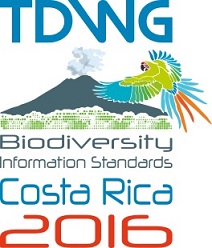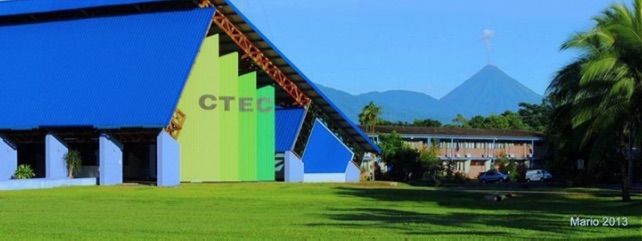TDWG 2016 Annual Conference http://www.tdwg.org/conference2016/
Link to Current Tracks (Proposed Symposia and Workshops)
Recordings from the meeting can be found on the TDWG 2016 Wiki.
From the TDWG 2016 website:
Conference Theme: Standards Supporting Innovation in Biodiversity Research and Conservation
 Standards for the description and exchange of biodiversity information help promote research, support decision-making for conservation and planning, and provide a means of communicating observations by both professional and citizen scientists across taxa and political boundaries. TDWG standards are an integral foundation of the largest biodiversity information sources, but given the wealth and diversity of information collected for plants, animals, and fossils, the need remains to extend and refine the concepts required to achieve greater integration for the discovery of knowledge and its use in biodiversity conservation.
Standards for the description and exchange of biodiversity information help promote research, support decision-making for conservation and planning, and provide a means of communicating observations by both professional and citizen scientists across taxa and political boundaries. TDWG standards are an integral foundation of the largest biodiversity information sources, but given the wealth and diversity of information collected for plants, animals, and fossils, the need remains to extend and refine the concepts required to achieve greater integration for the discovery of knowledge and its use in biodiversity conservation.
This year, TDWG is focusing its annual meeting on supporting research, decision making, and communication of biodiversity information, but also on how standards can under pin innovative research. Scientific innovations often "stand on the shoulders of giants," but they can also be disruptive -- causing major changes in the way that science works. To what extent do our standards promote innovation, and does the most innovative research show us where our standards need to be refined and extended? Current research both in Computer Science (e.g., deep learning, computer vision, ambient computing) and Biodiversity Sciences offers excellent opportunities for multidisciplinary innovative synergies among researchers, decision makers, students, and citizen scientists.
International Collaboration at TDWG 2016.
Plans for participating in TDWG 2016 are underway at iDigBio, in collaboration with Arthur Chapman (Australian Biodiversity Information Services), Antonio Saraiva (University of Sao Pauloa), Dimitrios Koureas (NHMUK), Jitendra Gaikwad (Germany German Centre for Integrative Biodiversity Research (iDiv)), Jennifer Hammock and Paul Kimberly (Smithsonian Institution), Simon Chagnoux (Muséum National d'Histoire Naturelle), Paul Flemons (Australian Museum), Robert Guralnick (University of Florida), Data Carpentry, Software Carpentry, and others.
Current activities planned include:
Pre-TDWG Software Carpentry Workshop from iDigBio: http://idigbio.github.io/2016-12-03-tdwg-costa-rica/ to be held on December 3-4, 2016. Sign up for a two-day Software Carpentry Workshop covering core skills needed to be productive in a small research team. Short tutorials alternate with practical exercises, and all instruction is done via live coding. All workshop participants are required to abide by our code of conduct to ensure that all attendees to have an enjoyable and fulfilling experience. The specific programming languages and tools taught will be customized based on your preferences. Core topics include automating tasks using the Unix shell, structured programming in Python, R, or MATLAB, and version control using Git or Mercurial. We plan to offer an additional half-day of training focused on using the big data available from the iDigBio project. This may include programming with web APIs, distributed computation with Apache Spark, or similar topics.
Symposium: Biodiversity Data Quality – issues, methods and tools. excerpt from the abstract: The goal of this Symposium is to discuss concepts, problems, policies, metadata, methodologies and mechanisms related to biodiversity data quality, which can be reused by the biodiversity informatics community collaboratively and incrementally. Conveners: Arthur Chapman, Antonio Saraiva, Alex Thompson
Symposium: Capacity Building Across Communities Using Biocollections Data: criteria, methods, courses, & credit. excerpt from the abstract: Critical data and computational literacy skills provide stakeholders with the means to produce fit-for-use data and reproducible scientific research. Currently, no comprehensive, community-derived, annotated list of biodiversity informatics literacy needs for our community exists. Bring your ideas and models, and let’s build some community-derived skills standards and best practices documentation in support of (disruptive?) inspiring research, and cross-disciplinary innovation. Conveners: Deborah Paul, Jitendra Gaikwad, Dimitrios Koureas
Symposium: Interoperability and Data Provenance for Online Crowdsourcing of Biodiversity Specimens. excerpt from the abstract: We propose a TDWG symposium that will include a selection of the five major online transcription platforms in our domain—DigiVol, Les Herbonautes, Notes from Nature, Smithsonian Institution’s Transcription Center, and Symbiota—as well as Biospex and the Worldwide Engagement for Digitizing Biocollections (WeDigBio) Event. Each speaker will be asked to outline their project needs, as they relate to the topic of the symposium. Conveners: Simon Chagnoux, Libby Ellwood, Paul Flemons, Edward Gilbert, Rob Guralnick, Paul Kimberly, Kevin Love, Austin Mast.
Symposium: Big Data Analysis Methods and Techniques as Applied to Biocollections. excerpt from the abstract: At TDWG 2016 we wish to provide a forum to present and discuss the issues associated with working with large datasets from multiple sources, such as cross-linking entities with imprecise identifiers, interpreting natural language using text mining, building clusters from data, high-speed searching of data, and visualizing millions of records. Our goal is to stimulate conversations about the technical tools people are using to work with large data, the algorithms they are finding useful, and how the data that is available effects those. We propose a hybrid symposium/workshop format where presenters will be given 25 minutes for their talks and follow-up questions from the audience. Presenters will be highly encouraged to include as part of their talk a demo of their running software or analyses, descriptions of features of the data that help or hinder analysis, sample code or pseudo-code, or a discussion of the merits of the software or libraries used in their analyses. Conveners: Matthew Collins, Jennifer Hammock, Alexander Thompson
Content edited from TDWG site http://www.tdwg.org/conference2016/








